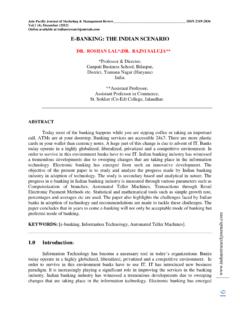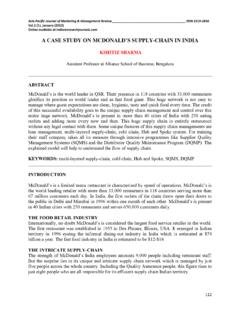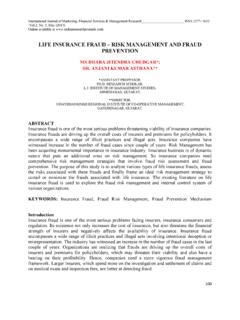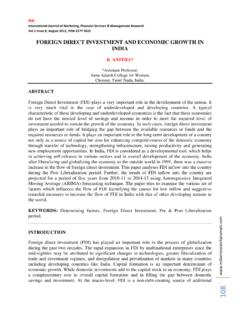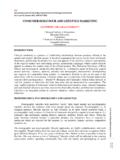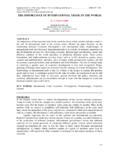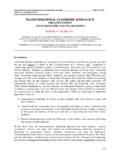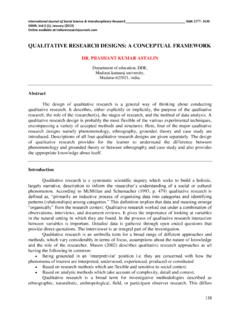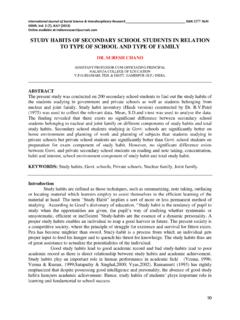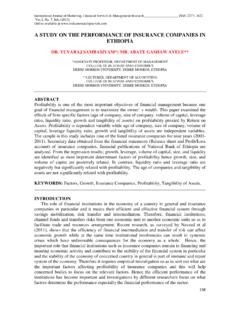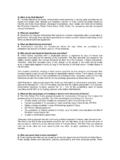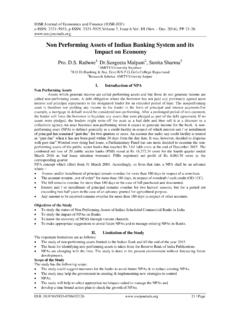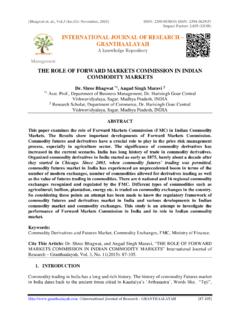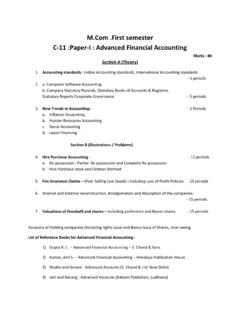Transcription of A STUDY ON FUNDAMENTAL AND TECHNICAL …
1 International Journal of Marketing, Financial Services & Management Research_____ ISSN 2277- 3622 , No. 5, May (2013) Online available at 44 A STUDY ON FUNDAMENTAL AND TECHNICAL ANALYSIS MR. SURESH ASSISTANT PROFESSOR, MBA DEPARTMENT, PES INSTITUTE OF TECHNOLOGY, BANGALORE SOUTH CAMPUS, 1KM BEFORE ELECTRONIC CITY, HOSUR ROAD, BANGALORE _____ ABSTRACT The unique nature of capital market instruments forces investors to depend strongly on FUNDAMENTAL factors in their investment decisions. These FUNDAMENTAL factors relate to the overall economy or a specific industry or a company. The performance of the securities that represent the company can be said to depend on the performance of the company itself. However, as companies are a part of industrial and business sector, which in turn are a part of overall economy, so even the economic and industry factors can affect the investment decision.
2 The selection of an investment will start with FUNDAMENTAL analysis. FUNDAMENTAL analysis examines the economic environment, industry performance and company performance before making an investment decision. KEYWORDS: Capital market, FUNDAMENTAL factors, investment decisions. _____ INTRODUCTION FUNDAMENTAL analysis is the examination of the underlying forces that affect the well being of the economy, industry groups and companies. As with most analysis, the goal is to develop a forecast of future price movement and profit from it. At the company level, FUNDAMENTAL analysis may involve examination of financial data, management, business concept and competition. At the industry level, there might be an examination of supply and demand forces of the products. For the national economy, FUNDAMENTAL analysis might focus on economic data to assess the present and future growth of the economy.
3 To forecast future stock prices, FUNDAMENTAL analysis combines economic, industry, and company analysis to derive a stock s fair value called intrinsic value. If fair value is not equal to the current stock price, FUNDAMENTAL analysts believe that the stock is either over or under valued. As the current market price will ultimately gravitate towards fair value, the fair value should be estimated to decide whether to buy the security or not. By believing that prices do not accurately reflect all available information, FUNDAMENTAL analysts look to capitalize on perceived price discrepancies. International Journal of Marketing, Financial Services & Management Research_____ ISSN 2277- 3622 , No. 5, May (2013) Online available at 45 FUNDAMENTAL Analysis is a method of evaluating a security by attempting to measure its intrinsic value by examining related economic, financial and other qualitative and quantitative factors.
4 FUNDAMENTAL analysts attempt to STUDY everything that can affect the security s value, including macroeconomic factors (like the overall economy and industry conditions) and individual specific factors (like the financial condition and management of companies). OBJECTIVES OF FUNDAMENTAL ANALYSIS To predict the direction of national economy because economic activity affects the corporate profit, investor attitudes and expectation and ultimately security prices. To estimate the stock price changes by studying the forces operating in the overall economy, as well as influences peculiar to industries and companies. To select the right time and right securities for the investment THREE PHASES OF FUNDAMENTAL ANALYSIS 1) Understanding of the macro-economic environment and developments (Economic Analysis) 2) Analyzing the prospects of the industry to which the firm belongs (Industry Analysis) 3) Assessing the projected performance of the company (Company Analysis) The three phase examination of FUNDAMENTAL analysis is also called as an EIC (Economy-Industry-Company analysis) framework or a top-down approach- Here the financial analyst first makes forecasts for the economy, then for industries and finally for companies.
5 The industry forecasts are based on the forecasts for the economy and in turn, the company forecasts are based on the forecasts for both the industry and the economy. Also in this approach, industry groups are compared against other industry groups and companies against other companies. Usually, companies are compared with others in the same group. For example, a telecom operator (Spice) would be compared to another telecom operator not to an oil company. Thus, the FUNDAMENTAL analysis is a 3 phase analysis of a) The economy b) The industry and c) The company International Journal of Marketing, Financial Services & Management Research_____ ISSN 2277- 3622 , No. 5, May (2013) Online available at 46 Phase Nature of Analysis Purpose Tools and techniques FIRST SECOND THIRD Economic Analysis Industry Analysis Company Analysis To access the general economic situation of the nation.
6 To assess the prospects of various industry groupings. To analyse the Financial and Non-financial aspects of a company to determine whether to buy, sell or hold the shares of a company. Economic indicators Industry life cycle analysis, Competitive analysis of industries etc. Analysis of Financial aspects: Sales, Profitability, EPS etc. Analysis of Non-financial aspects: management, corporate image, product quality etc. STRENGTHS OF FUNDAMENTAL ANALYSIS Long-term Trends FUNDAMENTAL analysis is good for long term investments based on long-term trends. The ability to identify and predict long-term economic, demographic, technological or consumer trends can benefit investors and helps in picking the right industry groups or companies.
7 Value Spotting Sound FUNDAMENTAL analysis will help identify companies that represent a good value. Some of the most legendary investors think for long-term and value. FUNDAMENTAL analysis can help uncover the companies with valuable assets, a strong balance sheet, stable earnings, and staying power. Business Acumen One of the most obvious, but less tangible rewards of FUNDAMENTAL analysis is the development of a thorough understanding of the business. After such painstaking research and analysis, an investor will be familiar with the key revenue and profit drivers behind a company.
8 Earnings and earnings expectations can be potent drivers of equity prices. A good understanding can help investors avoid companies that are prone to shortfalls and identify those that continue to deliver. International Journal of Marketing, Financial Services & Management Research_____ ISSN 2277- 3622 , No. 5, May (2013) Online available at 47 Value Drivers In addition to understanding the business, FUNDAMENTAL analysis allows investors to develop an understanding of the key value drivers within the company. A stock s price is heavily influenced by the industry group. By studying these groups, investors can better position themselves to identify opportunities that are high-risk (tech), low-risk (utilities), growth oriented (computer), value driven (oil), non cyclical (consumer staples), cyclical (transportation) etc.
9 Knowing Who is Who Stocks move as a group. Knowing a company s business, investors can better categorize stocks within their relevant industry group that can make a huge difference in relative valuations. The primary motive of buying a share is to sell it subsequently at a higher price. In many cases, dividends are also to be expected. Thus, dividends and price changes constitute the return from investing in shares. Consequently, an investor would be interested to know the dividend to be paid on the share in the future as also the future price of the share. These values can only be estimated and not predicted with certainty. These values are primarily determined by the performance of the company which in turn is influenced by the performance of the industry to which the company belongs and the general economic and socio-political scenario of the country.
10 An investor who would like to be rational and scientific in his investment activity has to evaluate a lot of information about the past performance and the expected future performance of companies, industries and the economy as a whole before taking investment decision. Each share is assumed to have an economic worth based on its present and future earning capacity. This is called its intrinsic value or FUNDAMENTAL value. The purpose of FUNDAMENTAL analysis is to evaluate the present and future earning capacity of a share based on the economy, industry and company fundamentals and thereby assess the intrinsic value of the share. The investor can then compare the intrinsic value of the share with the prevailing market price to arrive at an investment decision.
